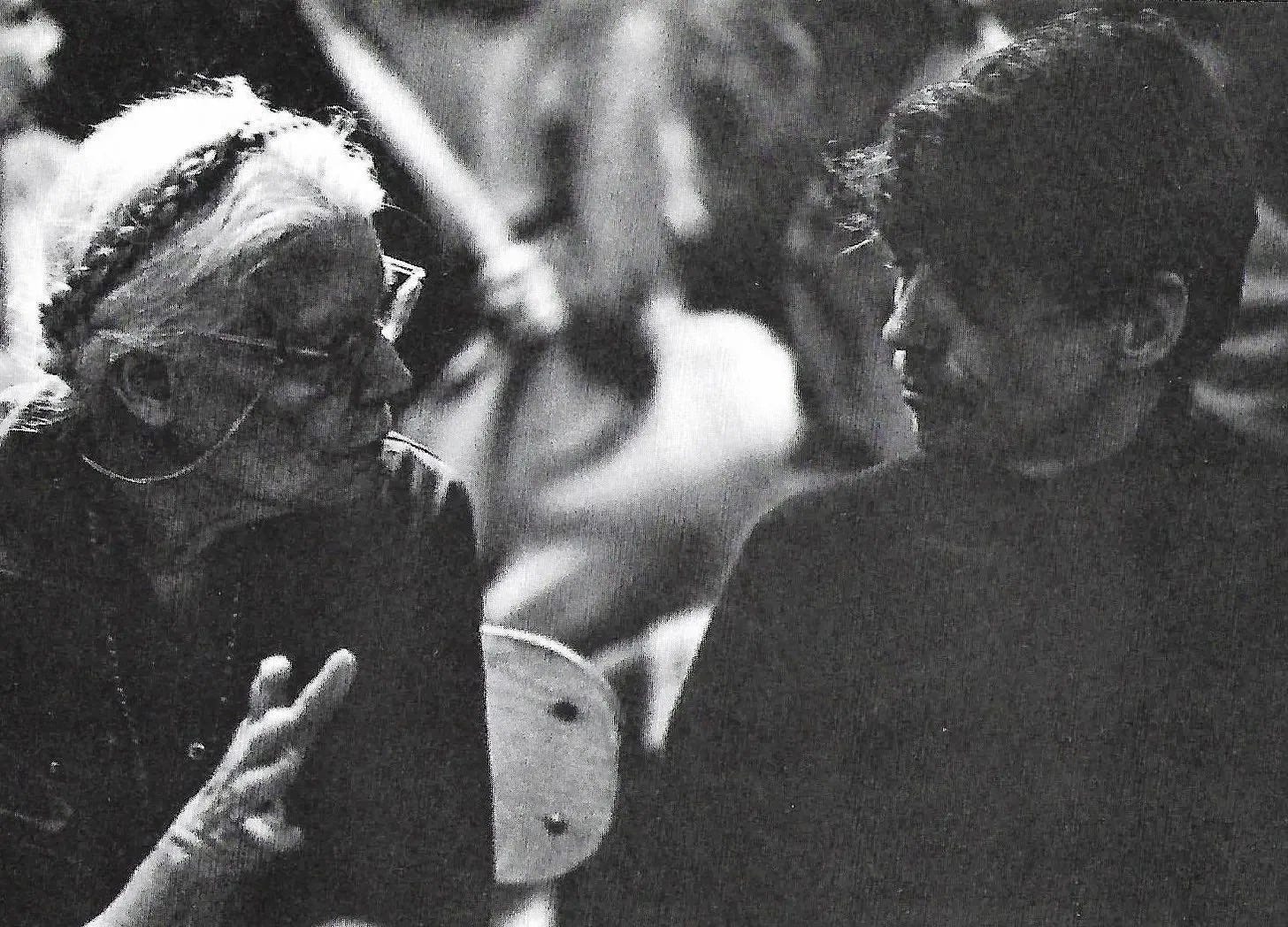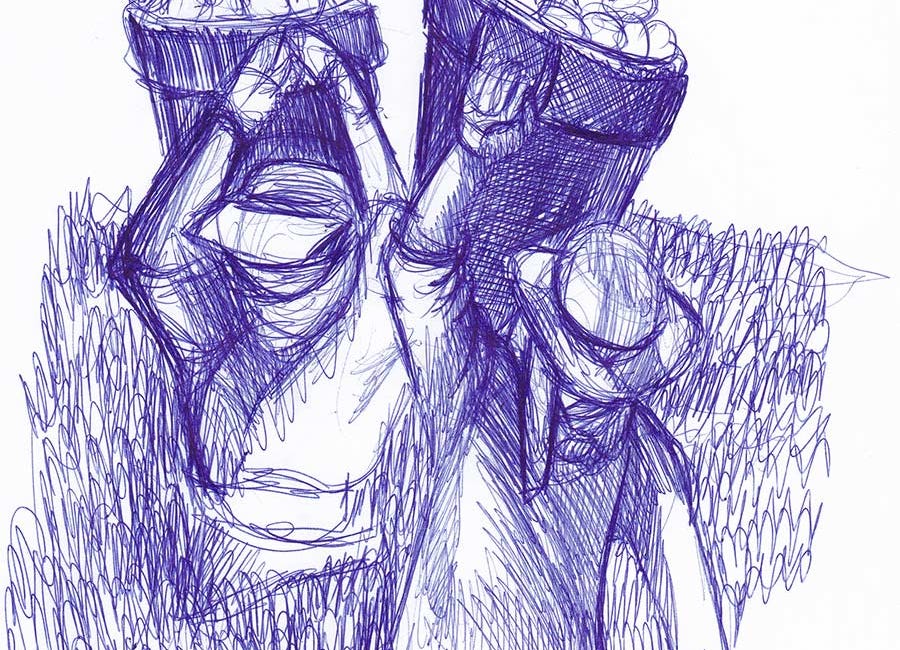"Holding Space in the Kin-Dom"
Catholic Workers from Wisconsin to Germany and Nashville to Connecticut are "making all things new"
Illuminating the Invisible
Every February, I spend as much spare time (and cash) as I can watching my way through the Academy Award nominees.
Although the Best Picture nominees garner headlines and cinematic re-releases, the nominated documentaries and short films are the true hits—the stories are poignant, heartbreaking, and often infuriating slices of life that might otherwise go unseen.
One of my new favorites—not a documentary, but a fourteen-minute short film whose drama comes right from headlines— A Lien, tells the story of an undocumented immigrant arriving for his green card interview.
Although arguments about immigration have filled our digital and physical atmosphere for the past month, many of the injustices immigrants face, including those explored in A Lien, seem to get overlooked in the chatter.
This week, Roundtable featured three different stories of immigration from the newspaper of Casa Juan Diego in Houston, Texas. These stories (linked below) make those invisible struggles visible. In his letter to U.S. Bishops last week, Pope Francis wrote that Christians should consider “the legitimacy of norms and public policies in the light of the dignity of the person and his or her fundamental rights, not vice versa.”
When considered in this light, our policies clearly have a long path of conversion ahead.
“What is built on the basis of force, and not on the truth about the equal dignity of every human being, begins badly and will end badly,” Pope Francis wrote in that same letter.
Much seems to be ending—badly—around us. But, in writing this newsletter, I came face to face with so many people—from Germany to Nashville—who are planting seeds of better futures. These Catholic Workers are taking Francis up on his call to “take a step forward in the construction of a society that is more fraternal, inclusive and respectful of the dignity of all.”
peace,
Renée
FEATURED
CW Reads: Immigration and Idolatry
On Monday, Pope Francis released a letter to the U.S. Catholic bishops clarifying the Church’s teaching on immigration “in these delicate moments that you are living” in the United States.
Our Thursday Newsletter shared three stories about immigration from the Houston Catholic Worker’s newspaper. One, from the most recent print edition, shares a powerful tale of the harrowing route from Venezuela up through Central America to the United States:
When we arrived in Guatemala the police stopped us to take money from us; and since we didn't have any, they touched our private parts to make sure we didn't have anything. When they saw that we had nothing, they let us go. We went to Mexico in order to get to Mexico City. After walking for various days, we stayed on the coast at a place called Puerto Escondido, where we slept in the street. We worked selling candies at the streetlights to be able to gather enough to continue to the city. Then, I worked at an Oxxo, a grocery store, begging for food and help. There, I slept with my son for approximately 2 weeks to be able to gather the money.
Read more at the link below:
Immigration and Idolatry
On Monday, Pope Francis released a letter to the U.S. Catholic bishops clarifying the Church’s teaching on immigration “in these delicate moments that you are living” in the United States. Not that the bishops needed any lessons on the matter; many of them have already issued statements in response to the new administration’s immigration policies and rh…
Dorothy Day and Daniel Berrigan Inspire A New “Order”

Lent is going to offer a new opportunity for congregants at St. Mary of Bethany Episcopal Church in Nashville, Tennessee. Pastor Rev. Danny Bryant has created a new Order of Berrigan and Day, to promote prayer, hospitality, and nonviolent alternatives to an economy built on war and exploitation.
“The Church needs to show the option of non-violent Christian anarchy,” Rev. Danny Bryant—“a church for Luigi,” Bryant half-flippantly called it, referring to Luigi Mangione, who murdered the United Healthcare CEO in Manhattan last December, and has touched a chord with young Americans outraged by the profiteering of insurance companies.
But, more seriously, Bryant said, this order is aimed at young people who are seriously looking for just, faith-based alternatives to the current system. Many young people, he noted, see no technique for change other than violence. Dan Berrigan, SJ, and Dorothy Day, Bryant said, can offer inspiration and hope: another, more peaceful way is possible.
Bryant’s new order puts a new spin on the age-old Benedictine “Ora et labora” for the twenty-first century. Bryant said their order’s principles are to welcome, listen, and co-labor with groups doing justice work in Nashville.
Although members of the order will not live together, interested members will be encouraged to practice welcoming and listening in their daily life—and notice when they are welcomed and listened to in return, Bryant said. Communal meals at the church will help foster the new community.
Bryant described the order as a merger of Jesuit and Quaker spirituality. In that spirit, the prayer commitment members will pledge to observe 15 minutes of silence a day or a 15-minute examen. Bryant hopes this order can draw young people of any faith or who have no faith.
St. Mary of Bethany is 10 years old and about 150 members strong, Bryant said. Bryant originally planted the church as part of the Anglican Church in North America (ACNA). When ACNA began embracing “culture war language,” Bryant said, St. Mary of Bethany left and found a new home in the Episcopal Free Communion. Bryant recently learned that the Episcopal Free Church was formed in 1897, the year of Dorothy Day’s birth.
That coincidence was a fitting sign, he felt, to bless their new endeavor.
Follow their efforts here:
COMMUNITY NEWS & NEWSLETTERS
Catholic Worker Farm Seeks Summer Volunteer
The John Paul II Catholic Worker Farm in Kansas City is seeking a Worker-Scholar for the summer, with the possibility of extending the stay. The farm offers an opportunity to grow food for the neighborhood while engaging in educational activities. The position involves approximately 25 hours per week of work on the well-developed urban farm, which includes assorted livestock. In exchange. The Worker-Scholar will receive private sleeping quarters with a half bathroom, access to a shared kitchen and living area, and a monthly stipend provided by the Maurin Academy.
See the listing on CatholicWorker.org. And check out the website for volunteer opportunities in Houston, Texas; Maloy Iowa; and Bloomington, Indiana.
Maryhouse Catholic Worker Hosts NPR Hopefuls
Earth Workers, a band that includes Liam Myers (Maryhouse, New York City), filmed its submission for the wildly popular NPR Tiny Desk Concert series in the auditorium of Maryhouse Catholic Worker in New York City. Watch on YouTube!
First Newsletter out of Little Platte
Little Platte Catholic Worker Farm’s First Newsletter was recently mailed to subscribers from their home in Little Platte, WI. It contains a reflection by co-founder Lincoln Morris, excerpted here:
How does it happen, to be made new? The Catholic Worker movement co-founder Peter Maurin was adamant that the green revolution was conditional on “building a new society in the shell of the old.” Drawing inspiration from Irish monks of the past, Peter suggests that societal change is built upon how individuals choose to embody their moral convictions in the here-and-now. An activist may call this prefigurative politics. A theologian may call this prophetic imagination. (Gen-Zers call this manifesting.) We will call this self-determination. How do we self-determine a new society? And how do we hold space in the kin-dom of God for morality and purpose?
Good questions. To follow their search for answers, sign up for their community mailing list here.
CW IN THE MEDIA
Catholic Worker Stand on Nuclear Disarmament Inspires Journalist
Journalist Matthew Royer wrote a piece about the end of Susan Crane (Redwood City Catholic Worker)’s 230-day prison sentence for National Catholic Reporter.
Roundtable reached out to Royer to get the story behind the story. A Los Angeles-based reporter who is currently a master’s student at USC Annenberg School for Communication and Journalism, Royer has reported on anti-semitism and extremism.
Royer heard Susan Crane's story through a post from the Los Angeles Catholic Worker that he came across while scrolling on Facebook. (Who says you can’t find hope while doom-scrolling?) Royer, who is Jewish, first heard of the Catholic Worker through his work as a journalist, reading other journalists’ work and in interviews and discussions with religious leaders.
Royer’s story notes the changing mood in Europe on nuclear weapons in light of the war with Russia. But he found the unwavering stand of Catholic Workers against nuclear weapons intriguing.
“War drives so much in the world and shifts people's perspectives, Royer shared in an email to Roundtable, “Often, faith is the driver that brings people together to act on those perspectives.”
Read Royer’s story about Susan Crane in NCR here.
Amistad Catholic Worker Named “Unsung Heroes”
Mark and Luz Colville of Amistad Catholic Worker (New Haven, CT) won an Unsung Heroes of New Haven award this week, which came with a gift of $4,000 from the Morris and Irmgard Wessel Fund.
“We believe that evangelization doesn’t begin with teaching or preaching or baptizing, it begins with hospitality. So we at Amistad try to practice hospitality as social action,” Mark Colville said in the Yale Daily News.
Remembering Rosemary Brennan
Rosemary Brennan, a former religious sister, mother, and labor activist who worked with Cesar Chavez and Dolores Huerta, and volunteered at the Oakland Catholic Worker, passed away on January 19, 2025.
The Oakland Catholic Worker began in 1986 to respond to “the urgent need for short term emergency housing for the hundreds of homeless immigrants who were fleeing the war in El Salvador.”
The community offers shelter and accompaniment to immigrants all over the Bay Area, according to their website:
These immigrants, who arrive at our front door often with only the clothes they are wearing, come to us after making treacherous journeys fleeing the unrelenting poverty, violence and oppression in their home countries of Mexico, Central and South America.
Read Rosemary's full obituary here.
WORDS FROM THE ELDERS
From “Three Traits”
by Peter Maurin, from the May 1942 issue of The Catholic Worker
I. Love of Freedom
Freedom is a duty
more than a right.
Man has a duty
to be intelligent.
Man has a duty
to choose intelligently
between two alternatives.
Man has a duty
to act intelligently,
using pure means
to reach pure aims.
To use impure means
to reach pure aims
is to take the wrong road.
You cannot go
where you want to go
by taking a road
which does not lead you there.
Having pure aims
and using pure means
is making the right use
of freedom.
About us. Roundtable covers the Catholic Worker Movement. This week’s Roundtable was produced by Jerry Windley-Daoust and Renée Roden. Art by Monica Welch at DovetailInk. Roundtable is an independent publication not associated with the New York Catholic Worker or The Catholic Worker newspaper. Send inquiries to roundtable@catholicworker.org.
Subscription management. Add CW Reads, our long-read edition, by managing your subscription here. Need to unsubscribe? Use the link at the bottom of this email. Need to cancel your paid subscription? Find out how here. Gift subscriptions can be purchased here.
Paid subscriptions. Paid subscriptions are entirely optional; free subscribers receive all the benefits that paid subscribers receive. Paid subscriptions fund the work of Roundtable and the operating costs of catholicworker.org. If you would like to stop seeing Substack’s prompts to upgrade to a paid subscription, email roundtable@catholicworker.org to resolve the issue.
















Thank you for sharing your thoughts and insights from various Catholic Worker communities. I look to this as part of my morning meditations.